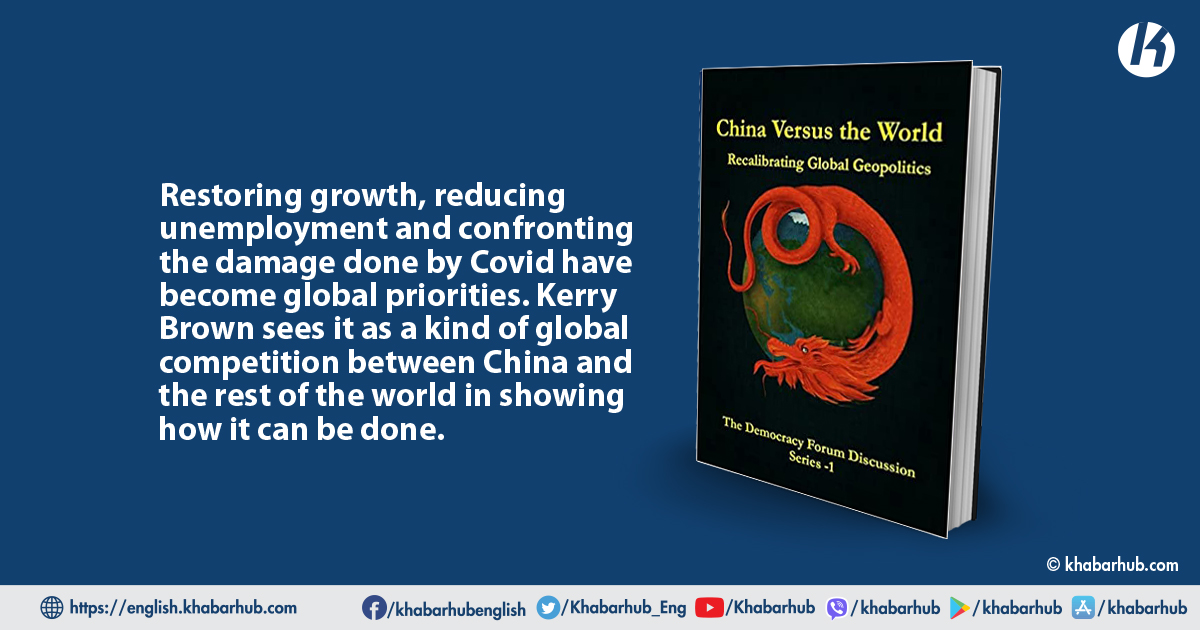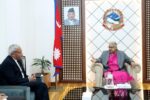The book “China Versus the World: Recalibrating Global Geopolitics” gives a breath of air to understand China’s behavior and covers a range of perspectives on China’s place in the world and how the world sees China.
The book, published by The Democracy Forum, contains articles on the basis of a series of webinars, and reflects the growing presence of China’s influence on the world’s radar, before and after both the pandemic and the change in the US Administration.
It has 204 pages and five chapters: New Narratives on China, Confrontation or Coexistence?, Challenges and Change, Strategic Ambiguity, and Spotlight on Tibet.
The book clearly mentions the need for seriously looking at China’s increasing challenge to the world order in the growing aggression in relations with its neighboring democratic antithesis India, ongoing tensions in the South China Sea and, with Taiwan and the whole Indo-Pacific region.
The book, which is the first in a planned series of short books, based on webinars and live conferences organized by The Democracy Forum and its New Delhi-based monthly sister publication “Asian Affairs”, covers key topics of international relations and global politics with particular relation to Asia.
The aim of the series is to examine key topics of international relations and global policies, with a particular focus on Asia.
“What the Covid crisis has revealed against is something about the nature of the Chinese government’s reluctance to make decisions at the lower levels”.
The opening chapter “New Narratives on China” talks about the changes in China’s approach to the international world order in the light of the Covid-19 pandemic.
It also talks about how China faced international criticism for its initial handling of the pandemic – through denial of suppression of evidence – for not being able to prevent the outbreak in its own territory or to stop the subsequent spread to other regions.
The Introduction section of the book says, “Moreover, its success later through unprecedentedly comprehensive measures of lockdown and quarantine for whole urban populations, has been to some extent dissipated by new evidence of the possibility of a Chinese research laboratory being the source of the transfer of the infection to humans.”
The book (Page 12) talks about restoring growth, reducing unemployment and confronting the damage done by Covid have become global priorities in which Kerry Brown sees as a kind of global competition between China and the rest of the world in showing how it can be done.
“A rules-based and democracy-led order in the Indo-Pacific has become more important than ever to ensure power stability.”
In the chapter “China, the US and the Indo-Pacific”, Professor Brahma Chellaney says, China’s aggressive expansionism is driving even distant powers like the UK, France and Germany to view a pluralistic, rules-based Indo-Pacific as central to international peace and security.
This chapter has also mentions about Dr Lynn Kuok, who says China’s enhanced territorial and maritime claims particularly in the South China Sea are also of major concern to the South East Asian states, which have resisted Chinese incursions into their internationally recognized Exclusive Economic Zones.
In the same chapter, Dr Neil Melvin talks about China’s dominance saying the country is too big and too integrated into the rest of the international system for a policy of “containment” to be either realistic or desirable.
“While many Southeast Asian countries want to curb China’s worst excesses, they do not want to be caught up in containing China’s rise, not least because many of these countries have also benefitted from it.”
Barry Gardiner, in the same chapter, talks about the impact of Belt and Road Initiatives (BRI) with China’s involvement in Pakistan, through the Middle and Near East, and down the whole of East Africa. He notes that the West’s failure adequately to meet the developments needs of those countries has given China an opportunity to step into the breach.
The chapter “Challenges and Change” focuses on the challenges to the international order presented by the rise of China power and influence.
In this chapter, Barry Gardiner sees the Chinese notion of “joint development” as a “way of pressurizing its neighbors to concede a share of the resources the international order had conclusively established were not theirs”.
Chapter 4 and 5 talk about general considerations of China’s global policies and the responses to them to an analysis of Chinese policies in two specific areas, Taiwan and Tibet, both of which – Tibet especially – are regarded by China as essentially domestic matters.
Both, however, have international implications which impact China’s relations with western powers, including the United States.
“Unless you transform China, China will transform you.”
The book also talks about Tibet and features contributions from politicians and activists both Tibetan and British. It has also clear points of comparison between China’s longstanding measures of cultural repression in Tibet and the tactics applied in Xinjiang which have more recently caused critical international reaction and shock.
The book in the chapter “Law of Karma”, quotes Dr Lobsang Sangay saying that although President Xi Jinping has appointed himself Chairman for life, nothing was certain – the Tibetans believe everything is impermanent.
This chapter also features Hong Kong, which is a completely different culture to China, and if China tries and completely subjugate Hong Kong to the Chinese state, as they have done and are doing with Tibet and the Uyghurs and everybody else, it could be the proverbial straw that breaks the camels’ back.
In fact, this chapter on Tibet has been a totem for the now much more notorious and globally reviled abuse of the Uyghur minority in Xinjian province and now the suppression of freedoms in Hong Kong.









Comment